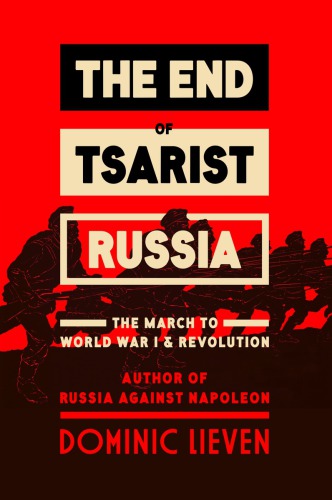
The End of Tsarist Russia
The March to World War I and Revolution
کتاب های مرتبط
- اطلاعات
- نقد و بررسی
- دیدگاه کاربران
نقد و بررسی

May 25, 2015
Using Russian and Soviet archives only recently opened to Western historians, Lieven (Russia Against Napoleon) constructs a Russian history of the years leading up to WWI and the Russian Revolution, arguing that, contrary to Western European sensibilities, WWI was primarily a conflict between two looming Eastern hegemons: Russia and Germany. Moving from broader geopolitical analysis and historical trends all the way down to a “worm’s-eye view” of history that focuses on the actions of a small cadre of influential decision makers in July and August 1914, Lieven charts Russia’s burgeoning “Second World” imperialism—a rise inevitably complicated by modernity and mass politics. Already humiliated by losing the Russo-Japanese War (1904–1905) and weakened by the 1905 revolution, Russia was ill-prepared for the demands of the 20th century. Lieven has a gift for illuminating the intricacies and complexities of tsarist Russia, but in doing so, he assumes a familiarity with Russian history likely beyond the casual reader, and his dry prose does little to support or engage novices. Nonetheless, Lieven’s uniquely Russian take on these decisive years stands as a significant work of scholarship. Maps & illus. Agent: Natasha Fairweather, United Agents (U.K.).

Starred review from June 1, 2015
Fresh research at the Foreign Ministry in Moscow (since closed) yields an insightful new look at Russia's pivotal role in the making of World War I. In this massive yet palatable work of research, scholar Lieven (Russia Against Napoleon: The True Story of the Campaigns of War and Peace, 2010, etc.), a fellow at Trinity College, Cambridge, and the British Academy, concentrates on Russian foreign policy as it maneuvered through shifting currents of "modern empire" and nationalism in the years leading up to Russia's entry in the war. The author emphasizes how the notion of imperialism was as pertinent within Europe as outside of it, namely in Austria's regard of Serbia as existing within its own orbit. Similarly, Russia was casting envious glances at Constantinople and the straits as the Ottoman Empire crumbled. Moreover, the fate of Ukraine-its population, industry, and agriculture-would tip the balance of European power as decisively then as it has today. Lieven engagingly sets out his history on two levels: the "God's-eye view," encompassing the big themes of geopolitics and balance of power; and the "worm's-eye view," which depicts how a handful of male leaders made the crucial decisions within a two-week period in July 1914, after the assassination of Archduke Franz Ferdinand, that would affect millions of people. Factors that fed international tensions included Germany's paranoia regarding Russia and the sense of an inevitable war between "the Teuton and the Slav," the role of the press as it "rattled and bedeviled policy makers," the lack of trust in Czar Nicholas II, and the rise of ethnic nationalism. The Russian empire's internal makeup was enormously complicated, and Lieven painstakingly walks readers through the important precursors-e.g., the revolution of 1905 and the Anglo-Russian entente of 1907-while introducing the key decision-makers. A Russian scholar opens up new, even startling historical connections.
COPYRIGHT(2015) Kirkus Reviews, ALL RIGHTS RESERVED.

July 1, 2015
"As much as anything, World War I turned on the fate of Ukraine." With this audacious statement, Lieven (history, Trinity Univ., Russia Against Napoleon; Towards the Flame) begins an intriguing and well-written history of World War I and the Russian Revolution of 1917. Based predominately on materials from seven Russian archives, Lieven's key premise is that the Great War was "the source and origin of most of the catastrophes that subsequently afflicted twentieth century Russia." He succeeds in supporting this statement and also reinforces other premises, such as the theory that World Wars I and II were both, essentially, eastern European wars. This results in a fascinating reappraisal of the place of Russia and the former Soviet Union in both conflicts. VERDICT Lieven's writing is clear and concise without being overly pedantic, which results in an engrossing read for anyone, academic or layman, with an interest in World War I, Russian history, eastern Europe, or the Russian Revolution. [See Prepub Alert, 2/23/15.]--John Sandstrom, New Mexico State Univ. Lib., Las Cruces
Copyright 2015 Library Journal, LLC Used with permission.

























دیدگاه کاربران